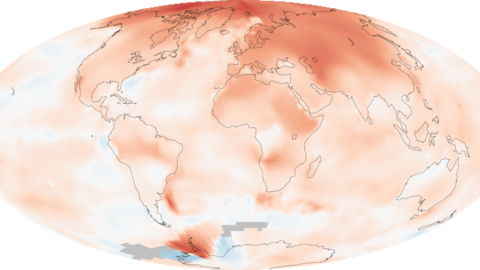The World Economic Forum’s Call to Action on Global Warming

What’s the Big Idea?
It costs more to treat sick people than it does to prevent people from getting sick in the first place. And so it is with global warming. It is cheaper to stave off the effects of catastrophic climate change than it is to pay the tab for natural disasters as they occur.
Consider two numbers.
$50 billion
$36 billion
According to a report issued in advance of the World Economic Forum’s annual meeting in Davos, Switzerland, we must spend $700 billion annually to wane ourselves off fossil fuels that have been linked to a rise in extreme weather-related disasters in recent years. “This investment is needed for clean energy infrastructure, low-carbon transport, energy efficiency and forestry to limit the global average temperature increase to 2°C above pre-industrial levels,” according to the report’s executive summary.
The lion’s share of the $700 billion must come from private finance, the Forum’s report states. However, public investments are required to spur the green growth transition. Specifically, the report states that a $36 billion increase in annual public spending on green infrastructure (the figure is currently $90 billion) is necessary to attract the $570 billion needed from private investors.
What’s the Significance?
While public resources are limited, let’s put these figures in perspective: $50 billion was the amount the U.S. Congress recently voted to allocate to pay for the damage caused by Hurricane Sandy. It will cost far less than that to jumpstart private investment in renewable energy, argues the report, which was produced by the Green Growth Action Alliance, headed by Felipe Calderón, the former president of Mexico.
Why is public spending necessary at all? Shouldn’t we rely on market forces to close the “green investment gap”? The Forum’s report argues that renewable energies are currently not on a level playing field with fossil-based energy, which has the advantage of existing subsidies and infrastructure. The smart use of public finance, however, can act as a catalyst to mobilize private investment and meet the climate change challenge.
You can read the full report here.
As global leaders prepare to meet in Davos, a packed agenda awaits them. A core question is how sustainable economic growth can be restored “in today’s volatile, interconnected world.” This question looms large for this elite brain trust considering that it misread the writing on the wall prior to the financial crisis in 2007.
In the video below, Kevin Steinberg, Chief Operating Officer of the World Economic Forum USA, reflects on that legacy.
Watch the video here:
Image courtesy of Shutterstock
Follow Daniel Honan on Twitter @Daniel Honan





